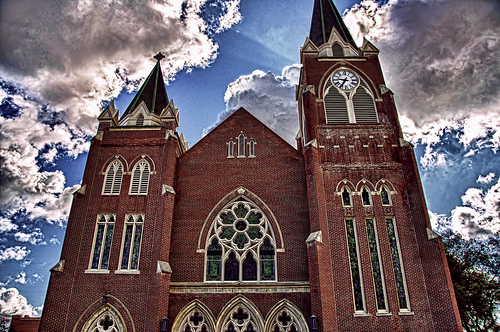We run our website the way we wished the whole internet worked: we provide high quality original content with no ads. We are funded solely by your direct support. Please consider supporting this project.
What Kind of Sinners Feel Welcomed by Your Church?
Perhaps the greatest indictment on evangelical churches today is that they are not generally known as refuge houses for sinners—places where hurting, wounded, sinful people can run and find love that does not question, an understanding that does not judge, and an acceptance that knows no conditions.
To be sure, evangelical churches are usually refuge houses for certain kinds of sinners—the loveless, the self-righteous, those apathetic toward the poor and unconcerned with issues of justice and race, the greedy, the gluttonous, and so on. People guilty of these sins usually feel little discomfort among us. But evangelical churches are not usually safe places for other kinds of sinners—those whose sins, ironically, tend to be much less frequently mentioned in the Bible than the religiously sanctioned sins.
It is rare indeed that a drunkard, drug addict, or prostitute would think of going to church because he or she just needed to feel loved and accepted. These people may go to bars, fellow addicts, drug dealers, or pimps to find refuge and acceptance, but they would not go to a church. In fact, as with the Pharisees in Jesus’ day, the church has generally represented everything people with these kinds of sins want to avoid at all costs. It has most often represented nothing but condemnation for these people. Indeed, churches frequently cultivate a reputation for “cracking down” on sins that fall into their “unsanctioned sin” category. To fail to do this, many have assumed, is to compromise our reputation for being set apart for holiness.
The sins we declare ourselves to be against are invariably selected to not target ourselves. If we were consistent in cracking down equally on all sins, we’d be cracking down on ourselves more than on those outside the church. And if we retained a system of evaluating sin at all, sins such as impatience, unkindness, rudeness, and self-righteousness—all indications that love is absent (1 Cor 13:4-5)—as well as prevalent “church” sins such as gossip, greed, and apathy would rank higher on our list than sins such as homosexuality or heterosexual promiscuity.
Striving for a holy reputation is also self-serving because the whole enterprise is unconsciously designed as a strategy for getting life for ourselves. Though it is mostly unconscious—indeed, though we uniformly deny it—we are feeding ourselves with our devised sin lists. We feel righteous and secure that we are “in” while others are “out” as we compare ourselves favorably with others who don’t measure up (according to our own biased measuring devise).
Above all else, love is that for which the church is called to be known. Sadly, in the name of acquiring for ourselves a reputation of holiness, we have often compromised the one reputation God calls us to have. Jesus was willing to forsake any possibility of having a holy reputation for the sake of loving those who were unholy.
To be sure, Christians are called to be a holy people, set apart by their good works. This is what transforming love looks like as it takes hold of people. But this is not a reputation we should seek to acquire or protect. The one reputation we are called to acquire is identical to the one reality we are called to live in: We are to be, and to be known as, a people who receive and give love in an outrageous, impartial, unconditional way.
—Adapted from Repenting of Religion, 102-104.
Category: General
Tags: Church, Homosexuality, Judgment, Kingdom Living, Repenting of Religion, Sin, Sinners
Related Reading

Guest Post: Culture War Neighbors by Bonnie Kristian
Matteo Parrini via Compfight The first time I was aware of meeting a gay person, I was 18. I took a summer job waiting tables, and it turned out two of my coworkers were attracted to people of the same sex. One, a waiter in his 40s, fit every stereotype on Will and Grace. The…

Living Jesus’ Prayer for Forgiveness
Luke 23:34: Jesus said, “Father, forgive them, for they do not know what they are doing.” Could anything be more shocking and yet more beautiful than this prayer? After being whipped, beaten, crowned with thorns, repeatedly mocked, spit upon, sneered at, and pierced with spikes through his wrists and ankles, while slowly suffocating as he…

7 Ways to Join the Kingdom Revolution
In the previous post, I introduced in short form the call to participate in the kingdom revolution that Jesus began. What does this mean for us today? Let me offer seven ways we are called to the Jesus revolution: When Jesus set aside the riches of his divine prerogatives and sided with the poor and…

As We Remember MLK
If you’ve never read Martin Luther King Jr’s Letter from a Birmingham Jail, you should take the time to do so. He wrote the letter to leaders of of the white churches in Birmingham in response to their public criticism of the civil disobedience that resulted in his arrest. It’s discouraging how relevant his thoughts are to current…

What Are the “Keys to the Kingdom”?
And I tell you that you are Peter [petros = rock], and on this rock I will build my church, and the gates of Hades will not overcome it. I will give you the keys of the kingdom of heaven; whatever you bind on earth will be bound in heaven, and whatever you loose on…

Podcast: What Will Keep Us from Falling Away in Heaven?
Greg talks heaven and hell in this solid little episode. http://traffic.libsyn.com/askgregboyd/Episode_0393.mp3 Painting: Fallen Angel By: Odilon Redon Date: 1872

